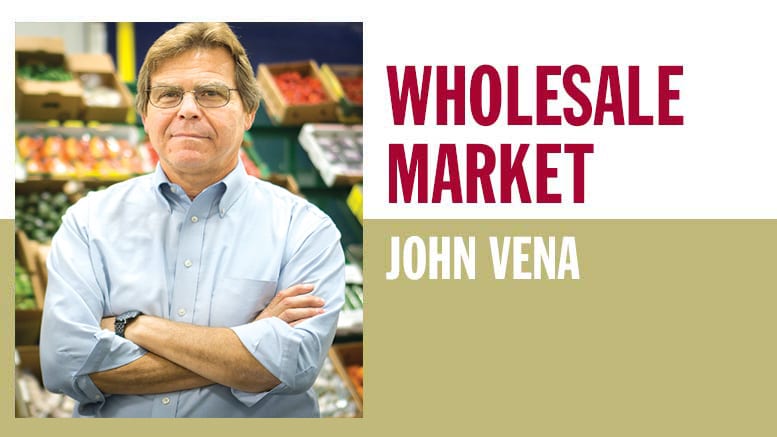A Wholesaler’s Value To A Shipper
November 4, 2020 | 4 min to read
In the family produce business, John Vena emphasized the importance of relationships with shippers, cultivated through personal visits and shared experiences. As his grandson, John Vena III, highlights, these connections have built a successful network that adapts to evolving market needs. The shift from in-person visits to relying on technology has diminished some valuable interactions, reinforcing that the industry's foundation is rooted in deep, personal ties that drive mutual success.

Originally printed in the October 2020 issue of Produce Business.
My grandfather, John Vena, who founded our family produce business in Philadelphia, worked fiercely to identify and develop his shippers. Without Google, websites, or national conventions, he did this with just his face, his car and his reputation. He spent part of every spring and summer on the backroads of New Jersey, Maryland and Delaware.
In the fall, he drove to Florida, stopping along the way to see shippers and potential shippers in Virginia, North Carolina and Georgia. As a little boy, my father accompanied his dad frequently enough that one of the growers in North Carolina kept a small goat cart for him to ride in during his visits. Once in Florida, my grandfather would spend time in the tomato, eggplant, and pepper fields and packing sheds that supplied his business on The Dock Street Market in Philadelphia.
Spending time with the farmer, meeting his family and staff and learning about his challenges built the relationships that built our business.
These relationships are the key to success for both the shipper and the wholesaler year after year. Unlike a foodservice or retail buyer that orders when the need arises or the market price is advantageous, the wholesaler is there for the shipper from the beginning to the end of the season. A wholesaler’s value to a shipper is based on that ongoing relationship, not on any single transaction.
Spending time with the farmer, meeting his family and staff and learning about his challenges built the relationships that built our business.
My father, John Vena II, did his share of traveling to Florida as a young produce man, but by then there was a well-established network of brokers shipping produce to the markets along the East Coast. However, he loved to visit his New Jersey growers in the summer and continued to visit long after those farmers had retired and “planted houses” in their fields and orchards.
Riding along with him from time to time, I learned to appreciate the back roads of Jersey and the effort he put into his grower relationships. And the best part? We always went home with a flat of strawberries, a bag of sweet corn or a crate of peaches.
As the business grew and we evolved into an importer of specialty produce, I began to travel to our overseas suppliers in Holland, Belgium and Israel. Walking the fields, greenhouses and distribution centers in those countries gave me a fresh perspective. I learned to see things from the grower/shipper’s point of view and I picked up some good stories to share with my customers.
Often, shippers count on their wholesalers to test new product lines or packaging. Participating in this kind of work deepens the relationship and can provide opportunity. For example, in the mid-1980s, we were among the first to offer Sharon Fruit (a persimmon from Israel) to the U.S. market and tapped into huge demand for this variety among our Korean clientele. There wasn’t much of a domestic supply of these kinds of persimmons at the time, and we moved nice volume to those customers.
In the late 1990s, we were offered greenhouse grown eggplant from Holland. The cost was high, but the product quickly found acceptance among several ethnic communities looking for an alternative to the commonly grown open field eggplant varieties.
As our business grew and the needs of some suppliers matured, we began to offer the kinds of services that added more value to our mutual interests. Often these services were not preplanned; they evolved along with our relationship. Some were looking for cross-docking and forward-distribution; others were looking for fruit preconditioning or quality control services. Our overseas trading partners frequently depend on us to give them an unbiased forecast of the market conditions for their products. As our shippers grew to rely on us, we become part of each shipper’s program throughout the year.
“Yes, I can search the Internet and I am addicted to e-mail, but I miss the trade shows and my visits to suppliers around the country and the world.”
Having started my career in the days before fax machines, when the biggest technological upgrade was “push button” phones, I miss what we have lost during these lockdown days. Yes, I can search the Internet and I am addicted to e-mail, but I miss the trade shows and my visits to suppliers around the country and the world.
Visiting shippers, walking their fields, and touring their greenhouses gives you a basic understanding of the problems they face every day and every season. It also gives you a chance to get to know your shippers as people and for them to learn more about you and your processes, trials and tribulations. Our industry is built on relationships, and relationships must be tended if they are to bear fruit.

John Vena III joined the family business in 1976 and is president of John Vena Inc., a specialty produce distributor on the Philadelphia Wholesale Produce Market. JVI has 85 employees and celebrated its 100th anniversary in 2019.
9 of 16 article in Produce Business November 2020

